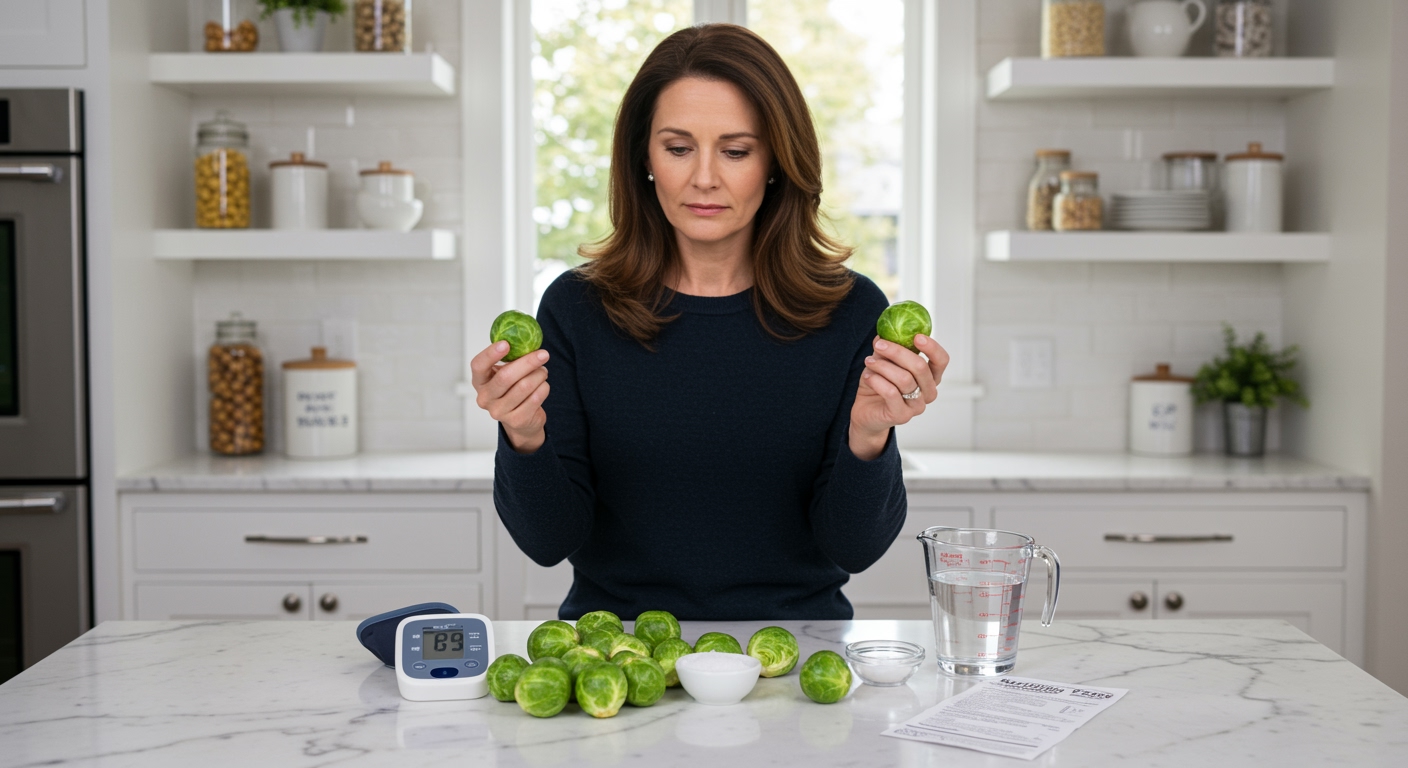✪ Key Takeaway: Brussels sprouts are unlikely to worsen low blood pressure and may actually help stabilize it through their nutrient content.
Introduction
You reach for those bright green Brussels sprouts at the grocery store, then suddenly wonder if they might make your already low blood pressure drop even further.
This concern makes perfect sense because many people with hypotension worry about foods that could potentially lower their blood pressure more than it already is.
Hi, I’m Abdur, your nutrition coach, and today I’m going to explain exactly how Brussels sprouts affect low blood pressure and whether you should include them in your diet.
What Makes Brussels Sprouts Different From Other Vegetables?
Brussels sprouts belong to the cruciferous vegetable family, which includes broccoli, cabbage, and cauliflower.
These vegetables contain unique compounds called glucosinolates that break down into sulfur-containing substances when you chew them.
The potassium content in Brussels sprouts is moderate compared to other vegetables, providing about 342 milligrams per cup.
Unlike some vegetables that are known for dramatic blood pressure effects, Brussels sprouts work more gently on your cardiovascular system.
Their fiber content helps slow down nutrient absorption, which prevents sudden changes in blood pressure.
✪ Fact: Brussels sprouts contain more vitamin K than most other vegetables, supporting healthy blood clotting.
How Do Brussels Sprouts Actually Affect Blood Pressure?
The potassium in Brussels sprouts does have a mild blood pressure lowering effect, but this effect is usually very gradual.
Your body processes the potassium slowly because it comes packaged with fiber and other nutrients that slow absorption.
The magnesium content in Brussels sprouts also supports healthy blood vessel function without causing dramatic pressure drops.
Research shows that people who eat cruciferous vegetables regularly tend to have more stable blood pressure patterns over time.
The antioxidants in Brussels sprouts help protect your blood vessels from damage, which can actually help prevent blood pressure from dropping too low.
Most people with low blood pressure can eat Brussels sprouts without experiencing any negative effects on their condition.
✪ Pro Tip: Cook Brussels sprouts with a pinch of sea salt to help maintain your sodium levels if you have hypotension.
Should You Avoid Brussels Sprouts With Low Blood Pressure?
You do not need to avoid Brussels sprouts if you have low blood pressure, but you should pay attention to how you prepare them.
Eating them raw in large quantities might provide more concentrated potassium, but cooking them reduces this concern.
The timing of consumption matters more than the Brussels sprouts themselves when you have hypotension.
Eating any vegetable on an empty stomach can sometimes cause a mild drop in blood pressure due to digestive blood flow changes.
If you notice dizziness after eating Brussels sprouts, try eating them with protein or healthy fats to slow digestion.
Most nutrition experts recommend that people with low blood pressure continue eating a variety of vegetables, including Brussels sprouts, for overall health.
✪ Note: Monitor your blood pressure response when trying any new food if you have severe hypotension.
What About Brussels Sprouts And Medication Interactions?
Brussels sprouts contain vitamin K, which can interact with blood-thinning medications like warfarin.
However, this interaction is more about blood clotting than blood pressure, so it affects different aspects of your cardiovascular health.
If you take medications for low blood pressure, Brussels sprouts are unlikely to interfere with their effectiveness.
The fiber content might slow down the absorption of some medications if you eat large amounts right before taking them.
Always space your vegetable consumption at least two hours away from medication times to avoid any potential absorption issues.
Talk to your doctor about your vegetable intake if you take multiple medications for heart conditions or blood pressure.
✪ Pro Tip: Keep a food diary to track how different vegetables affect your blood pressure readings.
How Should You Include Brussels Sprouts In Your Low Blood Pressure Diet?
Start with small portions of cooked Brussels sprouts to see how your body responds before eating larger amounts.
Roasting Brussels sprouts with olive oil and a pinch of salt provides healthy fats and sodium that can help maintain blood pressure.
Combine Brussels sprouts with protein sources like chicken or fish to create balanced meals that support stable blood pressure.
The cooking method you choose can affect how quickly your body absorbs the nutrients from Brussels sprouts.
Steaming preserves most nutrients while making them easier to digest than raw Brussels sprouts.
Aim for about half a cup of cooked Brussels sprouts per serving as part of a balanced meal plan.
✪ Fact: Brussels sprouts provide more vitamin C per serving than oranges, supporting healthy blood vessel function.
The Bottom Line
Brussels sprouts are safe for most people with low blood pressure and may actually help stabilize your cardiovascular health over time.
Good nutrition is about balance, not fear of individual foods, and Brussels sprouts offer valuable nutrients that support overall health.
I would love to hear about your experience with Brussels sprouts and low blood pressure, so please share your questions or feedback in the comments below.
References
At NutritionCrown, we use quality and credible sources to ensure our content is accurate and trustworthy. Below are the sources referenced in creating this article:
- Cleveland Clinic: Health Benefits of Brussels Sprouts
- WebMD: Brussels Sprout
- PMC: Cruciferous Vegetables and Cardiovascular Health





